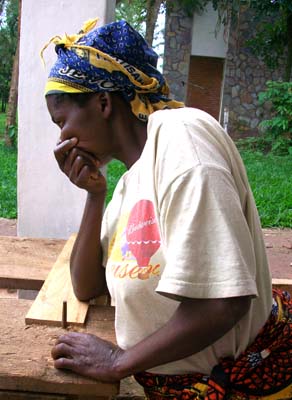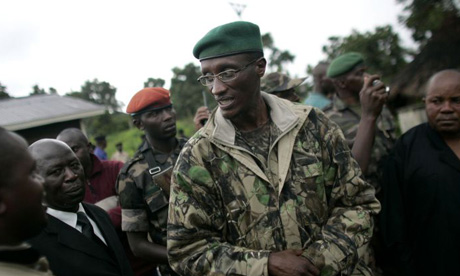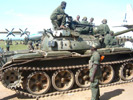This is a very important post in the NY Times from Jeffrey Gettelman:
"KIGALI,
Rwanda — There is a general rule in Africa, if not across the world: Behind any rebellion with legs is usually a meddling neighbor. And whether the
rebellion in eastern Congo explodes into another full-fledged war, and drags a large chunk of central Africa with it, seems likely to depend on the involvement of Rwanda, Congo’s tiny but disproportionately mighty neighbor."
This is more like a universal rule, and one of the most important to keep in mind. Although the Domino Effect seems like an antiquated concept, there does seem to be a real correlation between the fighting of one war and the beginning of the next war. The genocide in Rwanda had a major role in the problems that have since occurred in the Congo:
"There is a long and bloody history here, and this time around the evidence seems to be growing that Rwanda is meddling again in Congo’s troubles; at a minimum, the interference is on the part of many Rwandans. As before, Rwanda’s stake in Congo is a complex mix of strategic interest, business opportunity and the real fears of a nation that has heroically rebuilt itself after near obliteration by ethnic hatred."
Let's find out why:
"The signs are ever-more obvious, if not yet entirely open. Several demobilized Rwandan soldiers, speaking in hushed tones in Kigali, Rwanda’s tightly controlled capital, described a systematic effort by Rwanda’s government-run demobilization commission to send hundreds if not thousands of fighters to the rebel front lines.
Former rebel soldiers in Congo said that they had seen Rwandan officers plucking off the Rwandan flags from the shoulders of their fatigues after they had arrived and that Rwandan officers served as the backbone of the rebel army. Congolese wildlife rangers in the gorilla park on the thickly forested Rwanda-Congo border said countless heavily armed men routinely crossed over from Rwanda into Congo.
A Rwandan government administrator said a military hospital in Kigali was treating many Rwandan soldiers who were recently wounded while fighting in Congo, but the administrator said he could be jailed for talking about it.
There seems to be a reinvigorated sense of the longstanding brotherhood between the Congolese rebels, who are mostly ethnic Tutsi, and the Tutsi-led government of Rwanda, which has supported these same rebels in the past.
The brotherhood is relatively secret for now, just as it was in the late 1990s when Rwanda denied being involved in Congo, only to later admit that it was occupying a vast section of the country. Rwanda’s leaders are vigilant about not endangering their carefully crafted reputation as responsible, development-oriented friends of the West."
So this is an ethnic based intervention.
"Senior Rwandan officials do not deny that demobilized Rwandan soldiers are fighting in Congo, but they say the soldiers are doing it on their own, without any government backing.
“They are ordinary citizens, and if their travel documents are in order, they can go ahead and travel,” said Joseph Mutaboba, Rwanda’s special envoy for the Great Lakes region.
But according to several demobilized soldiers, Rwandan government officials are involved, providing bus fare for the men to travel to Congo and updating the rebel leadership each month on how many fighters from Rwanda are about to come over. Once they get to the rebel camps, the Rwandan veterans said, they flash their Rwandan Army identification cards and then are assigned to a rebel unit.
“We usually get a promotion,” said one fighter who was recently a corporal in the Rwandan Army and served as a sergeant in the rebel forces last month. He said that he could be severely punished if identified and that Rwandan officials and rebel commanders told the fighters not to say anything about the cooperation.
Another cause for suspicion is Rwanda’s past plundering of Congo’s rich trove of minerals, going back to the late 1990s when the Rwandan Army seized control of eastern Congo and pumped hundreds of millions of dollars of smuggled coltan, cassiterite and even diamonds back to Rwanda, according to United Nations documents.
Many current high-ranking Rwandan officials, including the minister of finance, the ambassador to China and the deputy director of the central bank, were executives at a holding company that a United Nations panel in 2002 implicated in the illicit mineral trade and called to be sanctioned. The officials say that they are no longer part of that company and that the company did nothing wrong. Nonetheless, eastern Congo’s lucrative mineral business still seems to be heavily influenced by ethnic Rwandan businessmen with close ties to Kigali."
So money is involved as well.
"Some of the most powerful players today, like Modeste Makabuza Ngoga, who runs a small empire of coffee, tea, transport and mineral companies in eastern Congo, are part of a Tutsi-dominated triangle involving the Rwandan government, the conflict-driven mineral trade and a powerful rebel movement led by a renegade general, Laurent Nkunda, a former officer in Rwanda’s army.
Several United Nations reports have accused Mr. Makabuza Ngoga of using strong-arm tactics to smuggle minerals from Congo to Rwanda and one report said that he enjoyed “close ties” to Rwanda’s president, Paul Kagame. This week a rebel spokesman said that Mr. Makabuza Ngoga was on Mr. Nkunda’s “College of Honorables,” essentially a rebel advisory board. Mr. Nkunda’s troops recently marched into areas known to be mineral rich — and areas where ethnic Rwandan businessmen are trying to gain a foothold.
Mr. Makabuza Ngoga said in an interview that he was not doing anything illegal.
“I’m just a businessman,” he said. “I work with them all.”
Sure you are. I doubt that he is doing anything illegal, if that means subject to some kind of legal jurisdiction.
"A Tale of Two Africas
Rwanda and Congo are polar opposites, a true David-and-Goliath matchup. Crossing the border from Gisenyi, Rwanda, to Goma, Congo, is a journey across two Africas, in the span of about 100 yards.
The two-minute walk takes you from one of the smallest, tidiest, most promising countries on the continent, where women in white rubber gloves sweep the streets every morning and government employees are at their desks by 7 a.m., to one of the biggest, messiest and most violent African states, home to a conflict that has killed more than five million people, more than any other since World War II."
Stop here. Register that figure in your mind: More Than 5 Million People Killed. That's over and above what happened in Rwanda.
"While Congo is vast, Rwanda is packed. While the Congolese are often playful, known for outlandish dress and great music, Rwandans are reserved. While Congo is naturally rich, Rwanda is perennially poor. Yet Rwanda has emerged as a darling of the aid world, praised for strong, uncorrupt leadership and the strides it has made in fighting AIDS and poverty.
The fates of the two countries are inextricably linked. In 1994, Hutu militias in Rwanda killed 800,000 people, mostly minority Tutsis, and then fled into eastern Congo. Rwanda responded by invading Congo in 1997 and 1998, denying it each time initially but later taking responsibility. Those invasions catalyzed years of war that drew in the armies of half a dozen African countries.
When the Rwandan military controlled eastern Congo from 1998 to 2002, it established a highly organized military-industrial network to illegally exploit Congo’s riches, according to United Nations documents.
A 2002 United Nations report said that top Rwandan military officers worked closely with some of the most notorious smugglers and arms traffickers in the world, including Viktor Bout, a former Soviet arms dealer nicknamed the Merchant of Death who was arrested this year.
“I used to see generals at the airport coming back from Congo with suitcases full of cash,” said a former Rwandan government official who said that if he was identified, he could be killed.
Rwanda may have a lot going for it — a high economic growth rate, low corruption, a Parliament with a majority of seats held by women. But many people here say they do not feel free. When the former government official was interviewed at a Kigali hotel, he abruptly stopped talking whenever the maid walked by.
“You never know,” he whispered, nodding toward the young woman who was smiling behind a plate-glass window smeared with soap suds. “She could be a lieutenant.”
It has many things going for it, but that should not be at the expense of the Congo.
"Scarred by a GenocideRwanda is tiny, tough and intensely patriotic. Like Israel, it is a postgenocidal state, built on an ethos of self-sacrifice. Its national motto is Never Again.
One oft-cited threat is the Democratic Forces for the Liberation of Rwanda, also known as the F.D.L.R., a mostly Hutu militia that is based just across the border in the green folds of eastern Congo. The militia is thought to number 5,000 to 10,000 fighters. Some of its leaders are wanted “genocidaires” who fled Rwanda in 1994 after massacring Tutsi.
“These guys want to come back and finish the job,” said Maj. Jill Rutaremara, a spokesman for Rwanda’s Defense Forces.
Mr. Nkunda, the rebel leader, has used the presence of the Hutu militia and the Congo government’s failure to disarm it as a rationale for his continued armed struggle. His forces have routed Congolese government troops in the past two months and pushed the region to the precipice of another regional war.
United Nations officials say he has not acted entirely alone, either: they said they observed Rwandan tanks firing from Rwandan territory to support Mr. Nkunda’s troops as they advanced in October. Rwandan officials denied this.
Rwandan military officers admit, when pressed, that the Hutu militia has little chance of destabilizing Rwanda. The last time it attacked inside Rwanda was 2001.
Some Western diplomats, Congolese officials and Rwandan dissidents now believe that the Rwandan government is simply using the F.D.L.R. as an excuse to prop up Mr. Nkunda and maintain a sphere of influence in the mineral-rich area across the border.
“These are people who want to make business, and they cover it up with politics,” said Faustin Twagiramungu, a former Rwandan prime minister now in exile in Belgium.
Congolese officials say that that the Rwandan government is making no efforts to bring the Hutu militiamen back into Rwanda because Rwanda wants to make sure that any Hutu-Tutsi violence plays out in Congo.
“What’s happening in eastern Congo is a Rwandese war is being fought on Congolese soil,” said Kikaya bin Karubi, a member of Congo’s Parliament.
Rwandan officials dismiss these claims with a confident chuckle.
“We want to deal with these guys here,” Major Rutaremara said. “We want them back.”
Mr. Mutaboba, the Rwandan government envoy, said the allegations were part of “an organized campaign to distort the whole problem and give it a regional dimension.”
“It’s not,” he said. “It’s a Congo problem.”
If Rwanda was a world problem, and it should have been, then the Congo is a world problem, and it should be.
"Ethnic and Business TiesBut it may be hard drawing a fine line between Congo and Rwanda, despite the lines on a map. There is a long history of ethnic and business ties that seamlessly flow across the colonially imposed borders, especially among the minority Tutsi who dominate business on both sides, yet at the same time, feel threatened and a heightened sense of community as a result.
For example, several demobilized Rwandan soldiers in Kigali said the vast majority of volunteers who recently crossed the border to fight with Mr. Nkunda were Tutsi. Some of the soldiers said that they had relatives living in eastern Congo and that it was like a second home to them.
According to four soldiers and one employee at the Rwandan demobilization commission, at the end of their monthly meetings, officials at the commission ask for anyone fit and ready to fight to stand up. Sometimes the commission provides bus fare to the border, the soldiers said, and other travel costs. The soldiers usually travel unarmed, picking up weapons on the other side, they said.
One demobilized Rwandan lieutenant who just got back from fighting in Congo looked surprised when asked why he went.
“Why? I am Tutsi,” he said. “One hundred percent Tutsi.”
I'm going to tell you my feeling about this. We should focus a higher percentage our efforts on where the most people are dying and suffering, and work our way down the list. The Congo might well head the list, with Sudan in the running.
Of course, this will mean focusing on other countries' interventions, like France's in Rwanda. And it will also mean that the Israeli-Palestinian Problem isn't the world's central problem, but one down the list.
I'm not saying that all these conflicts shouldn't be addressed in some fashion, only that we should focus where hundreds of thousands are dying, and that allowing these humongous numbers of people to die has been a terrible legacy of our time.
















































So, let me see: The UN won’t work, joint Rwandan/DRC actions won’t work, all sides commit war crimes. Can we at least find out what’s really going on?
Your comment is awaiting moderation.